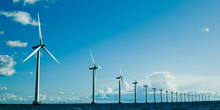Climate Change & Energy
Our Work
Latest in Transport
-
Greening taxes and subsidies in the Pacific
IEEP will share its expertise on environmental taxation and the reform of environmentally harmful subsidies at a forum event on greening taxation and subsidies in the Pacific region during the IUCN World Conservation Congress in Hawaii.
-
Land suitability assessments for bioenergy feedstocks in the EU – a review of data sources
Current data availability is inadequate to undertake a detailed national or European level study of land areas that are underutilised and could be considered available for bioenergy production within the EU.
-
Assessing sustainable biomass availability
Dr. Ben Allen presented IEEP’s views on the sustainable use of biomass at an international conference in Brussels. Understanding the scale of the resource is a key part of determining appropriate policy intervention and ensuring commercial viability.
-
New report: delivering low carbon transport fuels post 2020
How should EU policy support the transition to low carbon transport fuels post 2020? A new IEEP led report argues that future policies should be differentiated to tailor support towards specific objectives and technologies that offer the greatest potential for a low carbon future.
-
New report is out: delivering low carbon transport fuels post 2020
How should EU policy support the transition to low carbon transport fuels post 2020? A new IEEP led report argues that future policies should be differentiated to tailor support towards specific objectives and technologies that offer the greatest potential for a low carbon future.
-
Conclusion on ILUC in sight
After five years of discussion, a landmark moment has been reached whereby the indirect land use change (ILUC) impacts of biofuels almost certainly will be addressed in EU law.
-
Building a high value bioeconomy in the UK: opportunities from waste
The UK is exploring opportunities to develop a high value bioeconomy based initially on waste. IEEP is helping to identify international best practice examples in order to maximise the environmental and economic benefits of this new Government initiative.
-
The Manual: Chapter 2 - Air quality
This is a chapter of IEEP’s Manual of European Environmental Policy. This chapter focuses on EU air quality policy. The policy field is extensive and contains many directives that impose standards, provisions and developments of air quality management and regulation.
-
The Manual: Chapter 13 - Sectoral policies
This is a chapter of IEEP’s Manual of European Environmental Policy. This chapter sets out the development of some of the most important links between EU environmental policy and other policy areas, such as agriculture, forestry, fisheries, transport, trade, and so on.
-
Space for energy crops – An assessment on the potential contribution of Europe’s energy future
The overall energy potential that can be produced from growing dedicated energy crops on ‘spare’ land in the EU is low. This new report explores the potential for the additional production of energy crops in Europe on land not already used for food production, forestry, or providing other important services, and assesses some of the challenges associated with increasing output.
-
Press release - Biofuels don’t deliver but bioresources have promise
Biofuels produced from conventional agricultural crops deliver only limited reductions in greenhouse gas emissions (GHG) and compete for limited supplies of land.
-
Environmental policy and the UK’s review of the EU Balance of Competences
The UK Government’s Balance of Competences review has now taken evidence on 25 subject areas, including the 6 with the most relevance for the Environment. We take stock of the IEEP’s contributions, and consider what a possible UK renegotiation might mean for the environment.
-
Waste-based biofuels sector needs smarter EU 2030 package to realize its high potential
A robust sustainability framework and ambitious decarbonisation targets for transport fuels in 2030 are necessary to ensure efficient waste utilisation and the long-term reduction of transport emissions.
-
How to design EU biofuels policy for post-2020?
IEEP has organised two parallel workshops in Brussels and London to discuss with key EU and UK policy makers and stakeholders the future for EU biofuels policy post 2020.
-
How do the proposed new EU climate and energy targets stack up?
The Commission has suggested major changes in policy for 2030, with fewer binding targets. An institute briefing offers an analysis of what is proposed and sets out some proposals of where the package of measures could be strengthened, especially in relation to renewable energy and energy conservation.
-
Important decisions on future EU energy and climate policy ahead
Existing targets relating to renewable energy and energy efficiency appear at risk in Europe’s future energy and climate package.
-
Ministers place biofuels in a policy vacuum
Energy Ministers today failed to agree reforms to the EU laws that promote the use of biofuels for transport. Current EU legislation is flawed and unfit for the purpose of delivering verifiable greenhouse gas emission reductions from the transport sector.
-
Use of financial instruments to address climate change policy objectives
Proposals for financial instruments under the new 2014-2020 EU budget could benefit from further changes to help ensure adequate level of investment into a low-carbon, climate-resilient economy.
-
Biofuels and ILUC – Q&A
Recurring questions on biofuels and ILUC are addressed in IEEP’s latest report to help build a robust policy to deal with ILUC and other impacts of large scale production of first generation biofuels.
-
Press release - Shifting away from conventional biofuels
15 May – A new report produced by IEEP for ActionAid suggests that a sustainable advanced biofuel sector in the UK could not only lead to thousands of new jobs but also help to deliver better greenhouse gas (GHG) savings and improve the overall environmental and social performance of the biofuel sector.
Highlights
-

Land suitability assessments for bioenergy feedstocks in the EU – a review of data sources
Current data availability is inadequate to undertake a detailed national or European level study of land areas that are underutilised and could be considered available for bioenergy production within the EU.
-

New report: delivering low carbon transport fuels post 2020
How should EU policy support the transition to low carbon transport fuels post 2020? A new IEEP led report argues that future policies should be differentiated to tailor support towards specific objectives and technologies that offer the greatest potential for a low carbon future.
-

Use of financial instruments to address climate change policy objectives
-

Biofuels and ILUC – Q&A
-
Railways and Atmospheric Emissions: Fuel Duty and Related Issues. A Discussion Paper from IEEP
-
Railways and the Environment: Towards a Strategy for 2005 and Beyond
